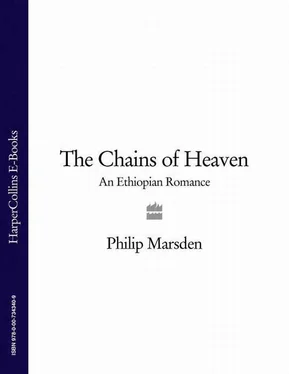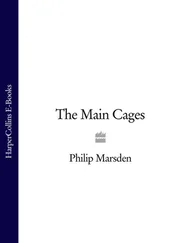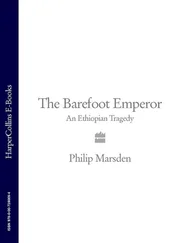While celebrating its complexity, Levine saw qene and samenna worq as an obstacle to progress in Ethiopia: ‘nothing could be more at odds with the ethos of modernisation than a cult of ambiguity…modern Western culture rests on a commitment to unambiguous communication’. At the time of his work, in the 1960s, ethnography was relying more and more on linguistics. And the most unambiguous language of all was about to come into its own: binary, the language of computers. In Ethiopia, the revolution was only a decade away.
The azmari pressed his ear to the sound box. He retuned the horsehair string.
‘The home of the beauty of Rayanz is at the banks of the Abbay river
His chest burns like the cooking-pan…’
The next verse was a little more direct:
‘Death is a horse always riding towards us Let’s eat and drink and keep that horse away.’
So we ate—I produced bread and biscuits, and water. I also fished out some money.
‘Whisky refreshes—beer cleans the blood It’s very good to play to Father Farenj! May God bless this green place where I met Father Farenj!’
The azmari untied the goat, put the masenqo over his back and set off southwards. We had walked on some way before Makonnen let out a sudden squeal of pleasure.
‘Father Farenj! Father Farenj!’ he mocked. ‘You—Father Farenj! With your pocket full of money!’
We dropped down into a third gorge. As we crossed the river and climbed up the first steep section we came across a boy half-sitting and half-lying beneath a bush. It was very hot. The sweat glistened on his cheek. Two flies were angled at the caruncle of one eye. He had malaria.
‘Leave me.’
‘You can’t stay down here,’ urged Hiluf. ‘Night is coming.’
‘Leave me…’
His chin dropped to his chest. We gave him water. We took him by the arms. Once on his feet he was able to walk.
‘Eat.’ Hiluf pressed biscuits on him. ‘You don’t feel hungry but you must eat.’ He was in no doubt that the boy would die if left in the gorge.
He was young—in his late teens—and his story was this. He and a few others had been taking grain to the mill. It was a good half-day walk. They were on their way back when the fever set in. He had dropped behind. Those with him wanted to get out of the gorge before dark. They drove on the donkeys and were soon out of sight.
He was now delirious. It was dusk by the time we reached his village. We saw him off to his hut and arranged to stay the night in another compound. It turned out to belong to one of those who had gone to the mill.
‘Why didn’t you go back for him?’ I asked. ‘He had no water, no food.’
‘It’s all right. We spoke to his relations. They were about to go back and collect him.’
In the morning we went to see him. He was still feverish. He was shy and grateful. But it turned out he was a hired hand. His own family, with not enough land to support him, lived two days’ walk away. There were no relations to go back. He was simply abandoned.
The next day we reached the bottom of the deepest gorge. Bisrat and Makonnen watered the mules and I lay on a slab of flood-smoothed granite. We were in shadow. High above me I could see sunlight catching tufts of clifftop grass.
The air was still. Heat pressed down into the narrow space between the cliffs. It was a heavy heat, not the familiar thin heat of the highlands. These chasms were like another element. Beneath them is a region known as maq where the bodies of sinners fall after burial (in Ge’ez, the Hebrew equivalent ‘ Sheol ’ is also used). Down there too is weqniyanos, the vast primal ocean into which flow all the rivers of the world. There was a time, according to the Ethiopians, when the earth itself was entirely smooth—but then came the flood, and in its wake it left the broken terrain that man struggles to live in now.
Thomas Burnet’s The Sacred Theory of the Earth puts forward a similar notion. I had stumbled on this wonderful piece of seventeenth-century literature years earlier in the British Library. I was chasing a reference to something called ‘the Abyssinian Philosophy’—which turned out not to be a piece of forgotten Ethiopian wisdom but a description of Burnet’s theory, turning as it did on the role of the ’abyss’.
Several things convinced me to carry on with Burnet. Could a notion of the ‘abyss’ have crept into the perception and spelling of Abyssinia, the name used for Ethiopia for many centuries? Was this another instance of Ethiopia representing an idea as much as a place? I was also hooked by Burnet’s extravagant imagery, his prose, and a sense of that heady freedom of thought possible in the early years of the Enlightenment when the world was still waiting to reveal its secrets.
In 1711 Joseph Addison discovered Burnet’s writings, and he too was ecstatic. In the Spectator
Конец ознакомительного фрагмента.
Текст предоставлен ООО «ЛитРес».
Прочитайте эту книгу целиком, купив полную легальную версию на ЛитРес.
Безопасно оплатить книгу можно банковской картой Visa, MasterCard, Maestro, со счета мобильного телефона, с платежного терминала, в салоне МТС или Связной, через PayPal, WebMoney, Яндекс.Деньги, QIWI Кошелек, бонусными картами или другим удобным Вам способом.











